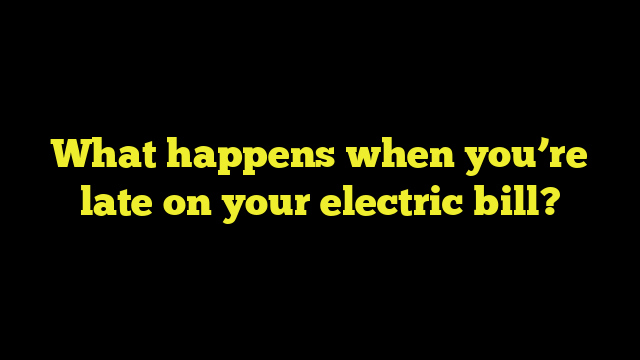
In today’s fast-paced world, electricity has become an essential part of our lives. It powers our homes, fuels our devices, and keeps us connected. However, life can sometimes throw unexpected financial challenges our way, causing us to fall behind on our bills, including the electric bill. In this blog post, we’ll delve into the consequences of being late on your electric bill, shedding light on the potential pitfalls and providing insights into how you can navigate through such situations.
The Immediate Impact
When you’re late on your electric bill, the first thing you’re likely to experience is a disruption in your power supply. Most utility companies have strict policies regarding overdue bills, which can result in a temporary disconnection of your electricity. This can be particularly inconvenient, especially during extreme weather conditions. Imagine sweltering in the summer heat without air conditioning or shivering through a winter night without heating – it’s a situation we all want to avoid.
Late Fees and Penalties
Apart from the immediate inconvenience of losing power, late payments can lead to additional financial burdens. Utility companies typically impose late fees and penalties for overdue electric bills. These fees can vary depending on your location and provider, but they can add up quickly and strain your already tight budget. The money that you could have used for other essential expenses now goes towards covering these avoidable charges.
Negative Impact on Credit Score
Believe it or not, your payment history for utility bills, including electric bills, can have an impact on your credit score. Some utility companies report late payments to credit bureaus, which can result in a negative mark on your credit report. A lower credit score can affect your ability to secure loans, credit cards, and even impact your housing options in the future. It’s essential to prioritize bill payments to maintain a healthy credit history.
Collection Agencies and Legal Action
Continued failure to pay your electric bill can escalate the situation further. Utility companies might eventually send your account to a collection agency. These agencies are known for their persistent efforts to recover the owed amount. Not only will you have to deal with collection calls and letters, but your credit score will also suffer another blow.
In some cases, utility companies have the legal right to disconnect your electricity and take legal action against you for non-payment. This could result in a court order, and you might find yourself facing additional court and attorney fees. It’s crucial to communicate with your utility provider if you’re facing financial difficulties to explore possible solutions and avoid the legal route.
Social Media Links and Community Support
Facing the consequences of being late on your electric bill can be overwhelming, but you’re not alone. Many individuals and families have been in similar situations. If you’re struggling, consider reaching out to your utility company to explain your circumstances. Some companies offer payment plans or assistance programs for customers facing financial hardships.
Additionally, the power of community support should not be underestimated. Connecting with local charities, nonprofit organizations, or government assistance programs can provide you with the resources you need to navigate through tough times. Sharing your experience on social media platforms might also lead you to discover valuable advice or support from others who have faced similar challenges.
Prevention and Mitigation
The best approach, of course, is to prevent the situation from arising in the first place. Here are a few steps you can take:
- Budgeting: Make sure to include your electric bill in your monthly budget. By planning ahead and allocating funds for your utility bills, you can avoid last-minute financial strain.
- Automated Payments: Setting up automated payments for your electric bill can help ensure that you never miss a due date. Just ensure that you have sufficient funds in your account when the payment is scheduled.
- Emergency Fund: Creating an emergency fund can provide a safety net for unexpected financial challenges. Even a small fund can make a significant difference when you’re faced with a late payment.
- Communication: If you anticipate difficulty in paying your bill on time, don’t hesitate to contact your utility company. They might be able to work out a payment plan or provide information on available assistance programs.
Conclusion
Being late on your electric bill can have far-reaching consequences, from immediate power disruptions to negative impacts on your credit score and even legal action. However, by understanding the potential outcomes and taking proactive measures, you can navigate through these challenges and ensure that your electricity remains uninterrupted. Remember, open communication with your utility provider and seeking community support can go a long way in helping you overcome financial difficulties and maintain a stable financial footing.
Connect with us on Twitter for more financial tips and advice on managing your utility bills effectively. We’re here to support you on your journey to financial well-being.